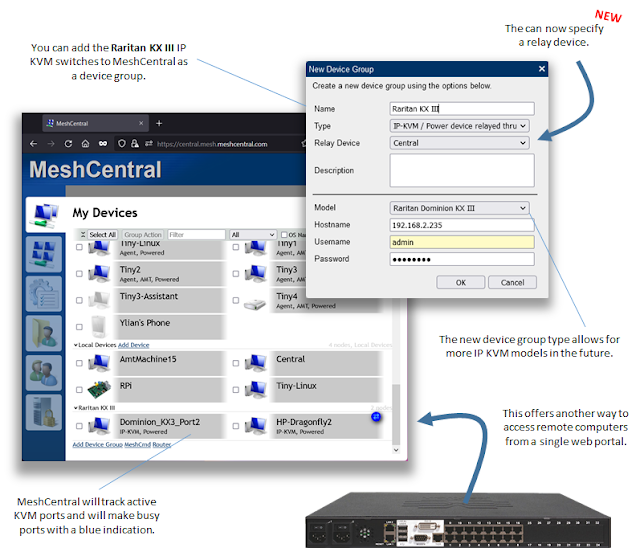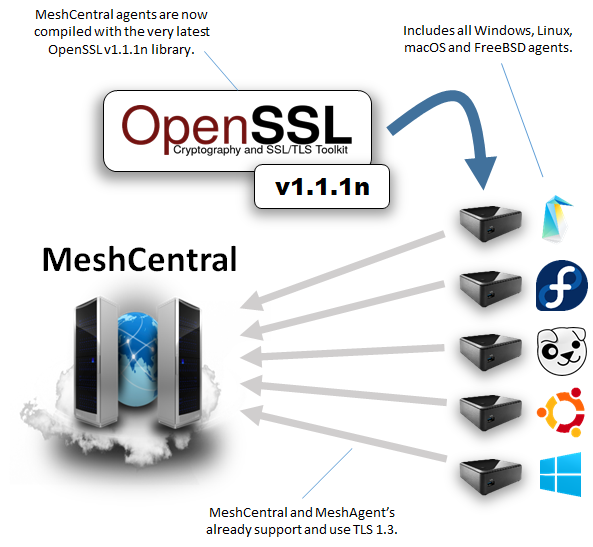MeshCentral - Device Groups with Relay Agent, Updated OpenSSL
This week, the manageability reach of MeshCentral is extending even more to devices that don’t run a MeshAgent and located on private networks. MeshCentral v1.0.11 was published with support for MeshAgent relays for various device groups. This new feature allows a user to manage devices on a local network that don’t have an agent installed by creating the device on MeshCentral and relaying the connection thru a MeshAgent that is on that local network. The same can also be done for Raritan and Web Power Switch devices. In detail:
- Local Device Group with Relay. MeshCentral supports the local device group allowing devices that do not have an agent to be managed thru MeshCentral with regular SSH, SFTP, RDP, VNC protocols. Until now, the MeshCentral server had to be in LAN or Hybrid modes to support his device group and the managed devices had to be on the same network as the MeshCentral server. Starting with v1.0.11, users can create a local device group specifying a MeshAgent as a relay. This makes it possible to manage agent-less devices from anywhere on the Internet even if the server is in WAN mode. Simply install a single device with a MeshAgent on a network and create a local device group with that device as the relay.
- Raritan and WebPowerSwitch with Relay. In addition to local device groups, the IP-KVM/Power switch device group was also improved to support a MeshAgent as a relay. This is big news for Raritan IP-KVM switch owners as you can now monitor your IP-KVM ports and access them remotely from the Internet. The same can be done with WebPowerSwitch allowing full out-of-band remote access to devices from anywhere in the world.
- Updated OpenSSL 1.1.1n. From time-to-time, OpenSSL issues security advisories and security fixes. Regardless of the severity of the issues, we keep MeshCentral updated with the latest version. In this case, there was a security advisory and a few weeks back, we updated the MeshAgent with OpenSSL 1.1.1n. You can type “versions” in the agent console or run “meshagent.exe -info” to see what version of OpenSSL is being using within that agent. Keeping on top of this makes sure MeshCentral is as secure as possible.
- Web Access by Device Name. In a quick last-minute addition to v1.0.11, you can now get to a device by specifying the device name in the URL by adding “?viewmode=10&gotodevicename=MyComputer” to the URL of the MeshCentral web page. The new “gotodevicename” will find a device with the specified name and navigate to that device’s page. This is perfect for integrating MeshCentral with other solutions but be aware that a computer name is not a unique identifier and so, “&gotonode=” is always the preferred way to access a device. This feature also works on the mobile web site.
Many other features have been added and bug fixes included. As usual, feedback is appreciated. If you see any problems or need support on something, please create a new issue on GitHub or help other users. For more information, visit the portal at https://meshcentral.com.
Enjoy!
Ylian
MeshCentral, Blog, Twitter,
Reddit, GitHub, YouTube.








